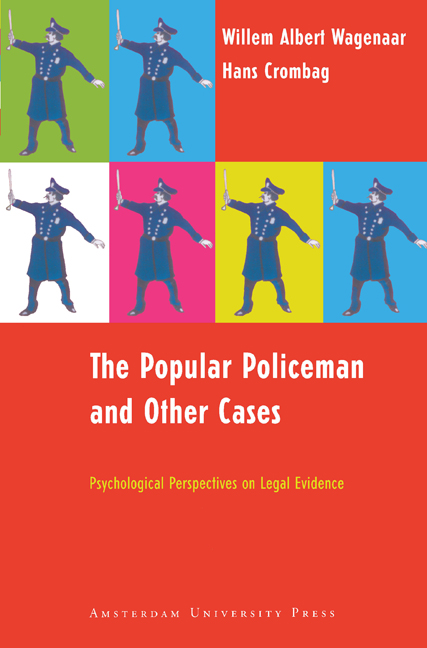Book contents
- Frontmatter
- Contents
- Foreword
- 1 Illegal Gambling or the Victory Travel Club
- 2 On Causal Reasoning or Death in the Warmoesstraat
- 3 Consumer Confusion or Potato Chips and Olive Oil
- 4 Fiction and Reality of ‘the Average Individual’ or the Case of Old Mr. Lane
- 5 Case Histories and Scientific Proof or the Case of JR
- 6 Not a Good Story or the Disappearance of Maddy and Vicky
- 7 Conflicting Scenarios or the Case of the Man who Needed a Companion
- 8 Two Processes Obstructing the Accuracy of Long-Term Memory or the Case of the Stolen Mercedes
- 9 Confessions after Repeated Interrogation or the Putten Murder Case
- 10 Collaborative Storytelling or the Artist’s Models and an Angry Neighbourhood
- 11 Allegation of Sexual Child Abuse in a Case of Disputed Visitation or Cindy's Story
- 12 Psychogenic Amnesia or the Case of the Amnesic Strangler
- 13 Obeying Reflexes or Death on the Climbing Wall
- 14 Visual Acuity or Shooting Mimi the Cat
- 15 Sexual Semiotics or the Case of the Popular Policeman
- Postscript: Psychological Expertise and the Law
- Bibliography
- Name Index
- Subject Index
11 - Allegation of Sexual Child Abuse in a Case of Disputed Visitation or Cindy's Story
Published online by Cambridge University Press: 16 February 2021
- Frontmatter
- Contents
- Foreword
- 1 Illegal Gambling or the Victory Travel Club
- 2 On Causal Reasoning or Death in the Warmoesstraat
- 3 Consumer Confusion or Potato Chips and Olive Oil
- 4 Fiction and Reality of ‘the Average Individual’ or the Case of Old Mr. Lane
- 5 Case Histories and Scientific Proof or the Case of JR
- 6 Not a Good Story or the Disappearance of Maddy and Vicky
- 7 Conflicting Scenarios or the Case of the Man who Needed a Companion
- 8 Two Processes Obstructing the Accuracy of Long-Term Memory or the Case of the Stolen Mercedes
- 9 Confessions after Repeated Interrogation or the Putten Murder Case
- 10 Collaborative Storytelling or the Artist’s Models and an Angry Neighbourhood
- 11 Allegation of Sexual Child Abuse in a Case of Disputed Visitation or Cindy's Story
- 12 Psychogenic Amnesia or the Case of the Amnesic Strangler
- 13 Obeying Reflexes or Death on the Climbing Wall
- 14 Visual Acuity or Shooting Mimi the Cat
- 15 Sexual Semiotics or the Case of the Popular Policeman
- Postscript: Psychological Expertise and the Law
- Bibliography
- Name Index
- Subject Index
Summary
It is a well-documented fact that the allegation of sexual abuse is often used as an argument – the ‘ultimate weapon’ as it was once called in a BBC documentary on the subject – in custody or visitation disputes following divorce (Thoennes & Tjaden, 1990). Typically, the accusation is made by the mother against the father, but it also happens that the father accuses the mother or the new friend or husband of the mother. Statistics show that about 33 to 50 percent of the allegations under these circumstances are false, although not always deliberately so. That number, though, is high enough to scrutinise the evidence critically, even though it must be realised that at least 50 percent of such allegations are probably true.
It follows from the situation of a divorced couple that the accusing party has hardly any possibility to collect other evidence than the story as told by the supposed victim, often a child below the age of six. The legally relevant question is therefore whether the testimony of a child as a witness, largely controlled by one parent for whom the stakes are probably high, can be sufficiently relied upon to convict the other parent who denies the accusation passionately, and in the absence of any other direct evidence.
Cindy's story
Mary and Lawrence were divorced in 1997,when their daughter Cindy was just two years old. Mary took Cindy to her new home in the Dutch village of Loenersloot, before there was a formal agreement about custody or the frequency of visits with Lawrence. In practice, Cindy visited her father about every other weekend. In 1998 Mary remarried with Federico Weinert, of Austrian nationality. In 1999 the couple decided to move to Austria and to take Cindy with them. Lawrence protested this and went to court, because he feared total alienation between him and his daughter. The court decided, against Mary's wish, that Cindy should visit her father for one week in the spring, one week in the autumn, and a full month during the summer holidays. In March 2000 Mary filed a complaint with the Dutch police, in which she accused Lawrence of sexually abusing Cindy during her visits to the Netherlands.
- Type
- Chapter
- Information
- The Popular Policeman and Other CasesPsychological Perspectives on Legal Evidence, pp. 177 - 194Publisher: Amsterdam University PressPrint publication year: 2012



